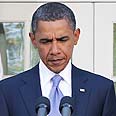
Enduring Obama’s pressure
Op-ed: PM Netanyahu should take advantage of broad support for Israel in America
Anyone claiming that Israel's prime minister cannot endure US presidential pressure – and therefore must accept sweeping concessions – is either dramatically mistaken, outrageously misleading or attempting to justify inability to endure pressure.
In August 2010, Israel was ranked by "The Rusmussen Report" – for the second year in a row – as the third most favored ally of the USA (71%), following Canada and Britain, ahead of Germany, Japan, France and Mexico, significantly ahead of Egypt (42%) and Saudi Arabia (21%).
In April 2010, "The Quinnipiac Institute" – often quoted by The New York Times, the Washington Post and CNN – documented public support for Obama's national security policy on all issues except one: Israel! By an overwhelming majority of 66%-19% Americans expect President Obama to further his support of Israel.
In February 2010, "Gallup" placed Israel as the 5th most popular country in the USA, while the Palestinian Authority was one of three least favorite entities along with North Korea and Iran.
In June 2010, "Gallup" determined that terrorism and the federal debt tie as the most worrisome issues to Americans, more than healthcare costs, unemployment, illegal immigration, US troops in Iraq and Afghanistan and the environment. In February 2010, "Gallup" confirmed that Americans do not trust the United Nations. These findings shed light on the broad common denominator between the US and Israel, which is perceived by Americans as the role model of counter-terrorism and defiance of the UN.
In September 2009, "The Rusmussen Report" found that Israel is one of only five countries that most Americans are willing to defend militarily. Israel is ranked third (59%) following Canada and Britain.
However, the "Super Poll" is taking place daily on Capitol Hill. House Members (about 75%) and Senators (about 85%) overwhelmingly support pro-Israel legislation and resolutions, even in opposition to the president. Legislators – and especially the 435 House Members who must run for reelection every two years – are extremely sensitive to the preferences of their constituents. They are aware of the clout and centrality of the voters under the American system of government, which is the most representative in the world, distributing equal power to Congress and the White House.
Consistent support since 17th century
Congressional support of Israel is expected to rise following the November 2010 election, when joined by scores of new members, most of whom will be national security-oriented, identify with Judeo-Christian values, suspicious of the UN and consider the Jewish State a unique spiritual and strategic ally in the battle against Islamic terrorism. Absent from the new Congress – which will be able to restrain/check the president domestically and externally – will be a few of Israel's harshest critics on Capitol Hill: the immensely powerful Chairman of the House Appropriations Committee David Obey (21 terms), Vic Snyder, Bill Delahunt, Carolyn Kilpatrick (7 terms each), etc.
The US public and Congressional identification with the Jewish State has been consistent since the 17th century, with the arrival of the early pilgrims to America. Therefore, there are more US sites bearing Biblical names than in any other country, and statutes of Moses feature prominently in the House Chamber on Capitol Hill and in the US Supreme Court.
In 1891, six years before the First Zionist Congress, the House Speaker, the Chairman of the House Foreign Relations Committee and 400 additional distinguished Americans signed the "Blackstone Memorial," which called for the establishment of a Jewish State in the Land of Israel. In 1922, both Chambers voted for a joint resolution, urging the establishment of a national Jewish home over the entire area between the Jordan River and the Mediterranean Sea.
In 2010, most public opinion polls document that support for the Jewish State constitutes one of the very few issues of consensus in an otherwise extremely polarized American society. The Jewish State has been showered by substantial support, in spite of Obama's policy, which is increasingly viewed by most Americans as radical-Left, irrespective of the "elite" media and notwithstanding hostility on university campuses and the double-standard in the UN and in Europe.
Submission to presidential pressure, by Israel's prime minister, while ignoring the unique support for the Jewish State by the American public and Congress, would amount to a slap in the face of US democracy, undermining Israel's most vital interests.
All Israeli prime ministers between Ben Gurion (1948) and Shamir (1992) leveraged Israel's support in the US, deflecting – in most cases – US presidential pressure, despite the limited material resources at their disposal. In 2010, Prime Minister Netanyahu leads a country that enjoys impressive economic, technological, industrial and defense capabilities, while the Free World is increasingly cognizant of the threatening Islamic sandstorms around the corner. Will Netanyahu follow in the footsteps of the 1948-1992 leaders, rather than pulling the rug from under the feet of Israel's supporters in the US?
- Follow Ynetnews on Facebook










